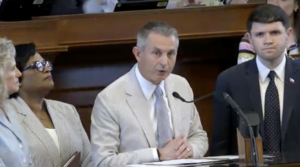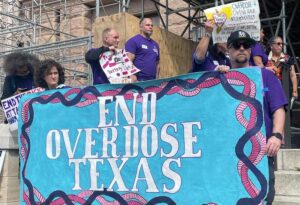Legislators from Austin are helping lead a bipartisan push to legalize fentanyl test strips, which can help drug users know whether they’re about to take a potentially deadly dose of fentanyl.
Many overdose victims aren’t even aware that they’re taking fentanyl, which dealers use to lace other drugs, such as fake prescription pills, cocaine, heroin, and methamphetamine.
Fentanyl test strips can tell users in a matter of minutes whether a sample contains traces of the deadly opioid. But the strips are classified as drug paraphernalia and therefore aren’t legal in Texas.
House Bill 362 would remove that classification, allowing nonprofits, health providers, and local governments to distribute the testing strips to users.
The bill’s lead author is Republican Tom Oliverson, a physician from Cypress. He introduced the bill on the floor of the Texas House on Monday flanked by co-authors Donna Howard (D-Austin), James Talarico (D-Austin), Sheryl Cole (D-Austin), and Teresa Leo-Wilson (R-Galveston).
It passed on second reading by a vote of 135 to 7.

Oliverson said, “Overdose deaths continue to skyrocket as fentanyl floods across our southern border, and we need a way to combat the crisis. Decriminalizing test strips is one way to do that by giving folks the opportunity to know in advance that the medication they have purchased contains a lethal drugs that will kill them the first time they take it.
In the other chamber, Austin’s state senator, Sarah Eckhardt, a Democrat, is co-author of an identical bill with Senator Bryan Hughes (R-Mineola). The bill hasn’t yet had a hearing but the Senate could take it up once the House finally approves HB 362.
If passed by both chambers, HB 362 would take effect September 1st.
Rare compromise
HB 362 represents a rare bipartisan effort on drug policy.
Republicans generally have approached the fentanyl crisis as a criminal justice matter, seeking to bolster border security and dismantle distribution networks. Democrats, on the other hand, have emphasized a public health approach, aiming to tackle underlying social drivers of addiction, eliminate stigma, and mitigate harm to users.
In past legislative sessions, Texas Republicans objected to legalizing fentanyl test strips out of concern that doing so could enable drug use. But Republican-controlled legislatures in several states legalized the strips last year, including Alabama and Tennessee.
In November 2022, an interim committee of the Texas House appointed by Speaker Dade Phelan to study opioid mitigation strategies published a report recommending legalization.
There is “no logical reason” to classify the test strips as drug paraphernalia, the report stated, adding, “Fentanyl testing strips do not increase illicit drug use.” Stephanie Klick, the chair of the House’s Public Health Committee, chaired that interim committee, which also included Oliverson, author of HB 362.
Governor Greg Abbott, who had opposed legalization during the 2021 legislative session, dropped his opposition in December, saying he had come to a “better understanding” of the issue.
At a House committee hearing on HB 362 in March, four witnesses testified in favor and none against. Another 30 witnesses registered in favor but did not testify, including representatives of the Texas Medical Association, Texas Hospital Association, Travis County, the City of Austin, and other cities and counties.
Overdose deaths spike
Fentanyl-related fatal overdoses in Travis County more than tripled in 2021, from 35 cases to 107, according to the Travis County Medical examiner. The state as a whole saw a near doubling of fentanyl-related deaths.
The situation worsened further last year. Travis County recorded another 118 fentanyl deaths in the first six months of the year—more than all of 2021. Data hasn’t yet been released for the second half of 2022.
Statewide, Texas saw amore than 500 percent increase in fentanyl-related deaths since 2019, according to provisional data from the Texas Department of State Health Services.

Before that the state had been relatively spared as waves of the fentanyl epidemic washed over other parts of the country. “Historically, over the past few years, most of our deaths have actually been the stimulants such as cocaine or methamphetamine. That is now starting to change,” said Dr. Keith Pinckard, Travis Chief Medical Examiner, in a March 2022 briefing to the commissioners court.
The trend prompted Travis County to declare a public health emergency in May last year and boost funding for the distribution of Narcan, a drug that can restore normal breathing to a person who has overdosed on fentanyl.
Travis County Judge Andy Brown said at that time, “The 2021 medical examiner’s report showed that there were about 308 overdose deaths in Travis County and it was now the number one cause of accidental death in Travis county, so it surpassed falls and automobile-related deaths.”
Austin, Round Rock, and Hays County schools have recently placed Narcan at schools and trained staff how to use it, following the death of four Hays County teens. “Often, teens use social media platforms to find and purchase what they think are Oxycontin, Percocet, or Xanax pills. Instead, drug dealers are substituting or mixing in fentanyl, a more potent, addictive, but cheaper drug,” the school superintendent, Hafedh Azaiez, wrote in a letter last September.
Five Hays ISD students have died of fentanyl overdose so far this school year.
‘One Pill Kills’
The House’s vote on House Bill 362 comes just days after an April 6th summit on the fentanyl crisis attended by state leaders, members of law enforcement, state agencies, and family members of victims of opioid overdoses.
The summit was held under the slogan “One Pill Kills,” in line with a $10 million awareness campaign launched last fall.
HB 362’s lead author Oliverson joined Abbott at two panel discussions to discuss the crisis. Talarico and Leo-Wilson joined another panel.
Oliverson, an anesthesiologist, said he had personally administered fentanyl “legally and safely for the last 30 years, and I’ve learned a few things.”
“Fentanyl is dangerous because it is so potent. It is 100 times more potent than morphine and a single packet of sugar of fentanyl can kill more than 500 people. So the legislature has heard the cries of family members who have lost loved ones, we have heard from law enforcement, we have heard from schools and teachers, we have heard from the medical community.”
“So we have designed a package of legislation from members in both houses as well as both parties, Republicans and Democrats working together to make sure we address everything from improving awareness, improving access to reversal agents that can save lives—I’m speaking specifically of Narcan availability, making sure that Narcan is available in our schools, making sure that our law enforcement and first responders have additional access to Narcan.”
“Additionally, we are working on legislation that will stop the flow of illegal fentanyl into our state and also give law enforcement the tools that they need to prosecute those that would distribute this poisonous medication to our loved once and to unsuspecting folks who may accidentally come into contact with it and end up succumbing to a fentanyl overdose.”
The Texas Senate on March 15th unanimously passed a bill to allow the prosecution of drug dealers for murder if they distribute fentanyl resulting in a deadly overdose. The bill would also stiffen the penalty for possessing or delivering larger quantities of fentanyl.
‘Bare minimum’
On the other hand, the Texas Harm Reduction Alliance held a rally at the state capitol February 15th saying Republican plans to address overdose deaths were inadequate. The protesters said that in addition to testing strips the legislature should expand access to Narcan, pass a stronger Good Samaritan law, and invest more in mental health and substance abuse care.

Several Democrat lawmakers spoke at the event, including Rep. Erin Zwiener (D-Driftwood), who represents the Hays County schools where the recent overdose deaths took place.
“I’m optimistic that we’re going to pass legislation to legalize test strips. I’m optimistic we’re going to make Narcan and naloxone (naloxone is the generic name for Narcan, a drug that rapidly reverses an opiod overdose) more available, and I want to urge y’all to not stop there. That is the bare minimum we can do in this building.”
Zwiener continued, “We have not invested in helping Texans get the access to mental healthcare and substance abuse care that they need. Yes, let’s advocate for test strips and let’s advocate for more Narcan. But let’s also advocate for Medicaid to fund more than 15 days a month for substance abuse treatment and for psychiatric inpatient treatment.”
“Let’s also advocate for Medicaid to cover step-down treatments so someone can still have support after they’ve been released from in-patient treatment.”

Similarly, Travis County Judge Brown said that legalizing fentanyl test strips “would make a big difference.” However, he cited “heartbreaking numbers” of 2022 overdose deaths, warning, “It’s likely they are going to get worse.”
Citing data from the county medical examiner that is yet to be released officially, Brown said, “Last year in Travis County the number of women who died from a drug overdose with fentanyl in their system increased 150 percent. The number of Black residents who died from a drug overdose with fentanyl in their system increased 180 percent. The number of Hispanic residents who died from a drug overdose with Fentanyl in their system is up 155 percent.”
Brown called for addressing unmet mental health needs: “We are housing people in our jail that need mental health help, and that is wrong. The Travis County jail, just like jails across Texas, is the largest mental health facility in Travis County and that is wrong.”







